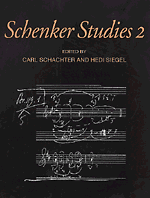Book contents
- Frontmatter
- Contents
- Abbreviated references to Schenker's writings
- Preface
- ARCHIVAL STUDIES
- ANALYTICAL STUDIES
- C. P. E. Bach and the fine art of transposition
- Comedy and structure in Haydn's symphonies
- “Symphonic breadth”: structural style in Mozart's symphonies
- “Structural momentum” and closure in Chopin's Nocturne Op. 9, No. 2
- On the first movement of Sibelius's Fourth Symphony: a Schenkerian view
- Voice leading as drama in Wozzeck
- Sequential expansion and Handelian phrase rhythm
- Strange dimensions: regularity and irregularity in deep levels of rhythmic reduction
- Diachronic transformation in a Schenkerian context: Brahms's Haydn Variations
- Bass-line articulations of the Urlinie
- Structure as foreground: “das Drama des Ursatzes”
- Index
Voice leading as drama in Wozzeck
Published online by Cambridge University Press: 12 January 2010
- Frontmatter
- Contents
- Abbreviated references to Schenker's writings
- Preface
- ARCHIVAL STUDIES
- ANALYTICAL STUDIES
- C. P. E. Bach and the fine art of transposition
- Comedy and structure in Haydn's symphonies
- “Symphonic breadth”: structural style in Mozart's symphonies
- “Structural momentum” and closure in Chopin's Nocturne Op. 9, No. 2
- On the first movement of Sibelius's Fourth Symphony: a Schenkerian view
- Voice leading as drama in Wozzeck
- Sequential expansion and Handelian phrase rhythm
- Strange dimensions: regularity and irregularity in deep levels of rhythmic reduction
- Diachronic transformation in a Schenkerian context: Brahms's Haydn Variations
- Bass-line articulations of the Urlinie
- Structure as foreground: “das Drama des Ursatzes”
- Index
Summary
Einer nach dem Andern!
Alban Berg's Wozzeck has been widely discussed since it was first performed – in fact, discussion began before the premiere – and a number of analyses, some going into great detail, have been published. What is perhaps most surprising is the degree of unanimity among analysts, given their divergent analytical approaches; despite some heat, there is sufficient light to speak of a consensus. This is a tribute to the clarity of Berg's musical thought, which is remarkable considering how complex and how new his idiom was. Leaving aside the truism that there will always be something to say about such a work, the consensus also begs the question of whether much is left to be said.
Given this situation, I must acknowledge that my essay appears to draw more heavily on the work of others than it does. Claims of priority are not the issue; I only hope to have a unity of vision (and not a singularity) about things that a number of us have noticed – a view that illuminates issues that have not been addressed previously. Among these issues is prolongation in posttonal music, which is of interest in connection with many works written in the first quarter of the century, and which ought not to be so settled as it has seemed.
Concerning my title, the question may be raised as to how voice leading can be viewed as drama. The expected, paratactic “Voice leading and drama” is a more typical title after all.
- Type
- Chapter
- Information
- Schenker Studies 2 , pp. 160 - 191Publisher: Cambridge University PressPrint publication year: 1999
- 2
- Cited by

